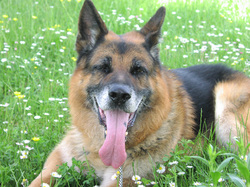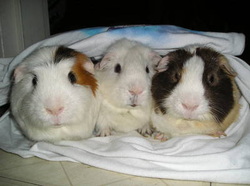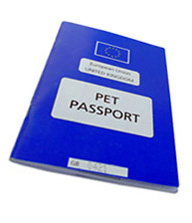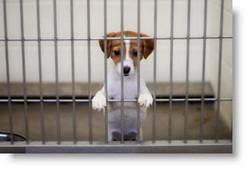 If there are any husky puppies for sale in your local area you might be tempted to buy one on impulse: they are very beautiful and unusual-looking dogs that seem somehow more like their wolf ancestors than do other breeds of dog. A husky can make a very loving pet but it takes a lot of looking after. There are many husky dogs and husky puppies available for re-homing through the RSPCA, mainly because people underestimate the amount of energy this breed has and how much care they need. They are also often found and taken to rehoming centres or rescue centres when they have become lost after running away from their owners. Husky dogs are born to move. They love to run and will do so at any given (or taken) opportunity. They love to explore and are very easily bored or distracted, so they will tend to try to make a dash for it if presented with something in the distance that is more interesting than what is right in front of it. And there’s absolutely no way you’ll outrun your husky, never mind catch up with it once it’s decided to run. Huskies are also impetuous and not terribly good at learning commands, so they are hard to train and not terribly obedient. Fortunately, though, the worst that your husky is likely to do is to run away from you, not attack someone or another dog. They don’t generally keep track of where they live or where they were when they last saw you, so getting lost is a real problem with husky dogs and husky puppies, so if you do get a husky you should make sure that they have a collar and nametag and preferably a microchip too. You can prevent your husky dog from running away by keeping them on a lead for walks and holding tight, and by securing your garden for when they are outside. That means a tall fence (at least five feet tall) and no possibility that they can dig underneath it! Husky dogs and puppies bore easily and if you are at work and they are at home, they might find things to play with that you wouldn’t want them to. You could avoid this by building a large, secure kennel for them in the garden so that they have their own space with plenty of their own toys. If you are going to choose a husky, though, you should really make sure that you have enough time and energy to dedicate to it and if you work long hours then it would not be fair to own this breed. You can often find husky puppies for sale or adoption through the RSPCA or other animal charities, which is a good alternative to buying them from private sellers or breeders because buying from the latter increases the number of dogs being bred every year whereas adopting one will give that dog a chance of a good home for life.
 If you are thinking about choosing a dog to join your family, you may be considering any number of breeds of dog or may be happy to take in a mongrel. Some people have particular affinity with particular breeds of dog, whilst some are open to choosing any dog that has the sort of temperament they are looking for. If you think of a ‘family’ pet dog, you are perhaps unlikely to immediately think of German Shepherds, since that breed is more commonly associated with the police or customs as working dogs, or even as attack or guard dogs for business premises. German Shepherd dogs are often used as working dogs for rescue workers, too. Yet German Shepherd dogs and German Shepherd puppies do in fact make excellent family pets. The reason that German Shepherd puppies are often chosen to be trained as working dogs is that they are so clever. They train very well, follow commands well and are very loyal to their handler. These features make them very good family pets, too, since they obey commands and will be protective towards their owners and family members. They are affectionate and loving and will play well with children provided they are trained and properly socialised as puppies. Some dog-breeders sell German Shepherd puppies without regard to their temperament, and so it is better to either buy your dog from a reputable, trusted breeder or better still to adopt from an animal charity such as the RSPCA. Adopting a German Shepherd dog or puppy will ensure that you are made aware of that particular dog or puppy’s temperament and familiarity with children. Some dogs of this breed, as with any other, simply do not mix well with children whilst others love them. If you adopt a German Shepherd puppy he will accept your children as part of his pack and be forever bonded with them; if you adopt an older dog it is vital that you introduce them to your family slowly and carefully and under careful supervision. There is no getting away from the fact that German Shepherd dogs are large and powerful and could do a lot of damage to a child or adult. But again, staff at a rescue centre would be able to tell you a lot about a dog’s personality and will have tested its temperament for you before allowing it to belong to a family with children. German Shepherd dogs and puppies need a lot of exercise and plenty of room to move around. They also eat a lot and will of course need regular check-ups and vaccinations with your vet. If you look after them properly, you will have a friend – and much-valued family member – for the rest of its life.
 For many people, a bulldog is the perfect pet dog to own. It is loyal and makes an excellent companion, and can also look pretty intimidating to would-be burglars (though usually bulldogs are too lazy or soft to actually do anything about a burglar other than perhaps bark). They make good pets for families, and usually enjoy being with children. However, as with all pedigrees, bulldogs have certain health problems that come from being bred for appearance over so many generations. In order to breed for appearance, there is often a lot of incestuous breeding that takes place or has done so historically. This has led to genetic abnormalities as well as physical deformities that are seen as desirable in a breed but that can cause problems for individual dogs. For example, bulldogs and bulldog puppies can find it hard to breathe because of their short windpipe and nose. Bulldogs and bulldog puppies are particularly prone to overheating, and whilst so far this year there hasn’t been much sun they can suffer very quickly when the temperature does eventually rise. Bulldogs have very short noses and are usually very stocky and find it hard to pant, which is how dogs normally keep cool. If it gets warm outsider or in your home, check your bulldog regularly for signs of heat stroke, such as loud breathing, being sick, appearing to ignore you or being unaware of your presence. Their gums may also be dry to the touch. If you think that your bulldog is suffering from heatstroke, take them somewhere cool and give them some fresh, cool water to drink; take a towel and moisten it with cool (not cold) water and gently rub your dog with it, on its nose, head and back. If your bulldog doesn’t improve, or if it suffers any kind of fit or loses consciousness, take it immediately to your local vet for urgent treatment. Of course, prevention is better than cure and so get your bulldog puppies accustomed early on to keeping to the shade in sunny weather and don’t take them out in the hottest part of the day (11am – 2pm) if it’s very warm. When travelling, always take cool water with you (carrying it in a flask will keep it cool even on a hot day) and don’t let your bulldog keep playing when it starts to get hot – the dog will want to keep going because they love to play, but you must be responsible and stop the games to help your dog to cool down. If you want a bulldog as a pet, you can often adopt them through animal charities such as the RSPCA because they are often available for re-homing. If there are none available when you are searching, you can always ask to be contacted when one becomes available.
 When your children are very small, it can be very tempting to please them by buying them a pet – you may well remember being refused a pet when you were little and want your children to have experiences that you were once denied. But until a child is about four years old, they won’t be able to grasp the concept of what a pet is, let alone what the responsibilities are of caring for a pet. And once they reach the age of four or five, they’re not ready to take on all the responsibilities that come with owning a pet, though they will appreciate the idea of having a little creature to love and play with. As a responsible parent you would of course take care to ensure that your child knows how to ‘play’ with their new pet, and that they are capable of understanding the need to be careful and gentle with their pet at all times – they have to understand that it is not a toy. You could just get a goldfish for your child, but most children want something a bit more ‘interactive’ and would prefer something furry and playful. You, on the other hand, just want a pet that is relatively easy to care for. Hamsters and guinea pigs are the most popular types of pet that people buy for their younger children, since these are relatively easy to care for (compared to, say, a dog) and they are small and fluffy, and interesting for your child to play with and help to care for. Hamsters are content to be housed in a relatively small cage (compared to guinea pigs, who need plenty of room to move around) and they don’t cost a great deal to care for. They are interesting little creatures to watch, as they are energetic and like to interact with whatever toys and bits and pieces you add to their cage for them. They love playing in those little balls you can buy to explore their wider environment, which your child will also enjoy watching. They don’t mind being handled, though of course with all rodents care must be taken to ensure that your child holds them properly, securely and gently, as squeezing or dropping them could lead to serious injury for your pet. Some hamsters do bite, so be sure that yours has a temperament that will tolerate being handled before allowing your child to do so. Hamsters don’t tend to fall ill very often, but they can be very expensive to treat if they do, so although it may seem an unnecessary expense if you never have to call upon it, having pet insurance in place is a good idea even for such a small pet. They normally only live for about 2 – 3 years. Hamsters are nocturnal, so they may only want to play out in the evening. Don’t keep your hamster’s cage in your child’s room as they do make a lot of noise when they’re awake at night. Guinea pigs are rather larger and need more space. Unlike hamsters, they are most active and awake during daylight hours and they’re not as active or playful as hamsters. So they may not be as much fun to watch, but they’re certainly much more likely to be the sort of pet your child can cuddle and stroke, or sit with. They live for about 5 – 7 years, which is a good length of time for a first pet (one of the benefits of giving a pet to a child is to help them to understand and experience death on a relatively small scale before they experience it with family members). Guinea pigs tend to create more allergies than hamsters do, partly because they need hay for their diet but also because of differences in their fur. Like hamsters, if guinea pigs need veterinary care the bills are likely to be large, so taking out pet insurance is a good idea. If you decide to get a hamster or guinea pig for your child, you could choose to adopt one from an animal charity such as the RSPCA. The advantages of doing so are plentiful: the rescue centre workers will be familiar with the temperament and nature of the animals in their care and can advise which will make good pets for small children; the hamsters or guinea pigs will have been checked for ill health and by adopting a pet you will be playing a small part in reducing the number of such pets bred for sale when so many end up in rescue centres after people grow bored of caring for them.
 If you own a holiday cottage, particularly if you are located somewhere that people like to base themselves for walking holidays or to enjoy the countryside, you might want to consider marketing your business as dog- or pet-friendly. Dog friendly holiday cottages are those which specifically appeal to dog owners wishing to take their dogs with them on holidays and tend to be located in the countryside. Pet friendly holiday cottages welcome most types of pet (some do not allow birds) and can be located anywhere. During these hard economic times, increasing your number of potential customers is a must, and advertising your holiday accommodation as being pet-friendly or dog-friendly will add to the number of people who might be interested in staying there. It is true, though, that people with allergies might avoid booking pet friendly holiday cottages in case their stay is made uncomfortable by fur or hair residue in the air. But the number of pet owners will outweigh the number of pet-allergy sufferers wanting to book holiday cottages anyway. If a pet owner enjoys their stay and feels truly welcomed, they will return and they will also tell plenty of other people about their stay, whether online or whilst out walking their dogs or talking with other pet-owners at the vet. You can also take advantage of some free online advertising on pet websites for being pet-friendly. If you decide to make your holiday cottage pet- or dog-friendly, there are some things that you need to consider. First and foremost, you need to make sure that your accommodation is genuinely pet-friendly and not merely tolerant of pets or dogs. Pet owners will instantly know the difference and a poor experience can reduce your bookings as word gets round (particularly through online review sites). You need a proper pet policy in place that sets out what you would expect from owners and pets staying in your accommodation (it is not unreasonable to set boundaries); you also need to make sure that your accommodation is located suitably to meet the needs of your guests but also not to inconvenience neighbours. For instance, if your holiday cottage adjoins a neighbouring property, your neighbours may not be thrilled if a visiting cat uses their garden as a toilet, or if a visiting dog keeps them awake all night barking because it is in a strange place. Nor will your guests be thrilled if there is nowhere immediately close where they can take their dogs to use the toilet (having a designated doggy toilet is a good idea; mark off an area with a fence but make it clear that your guests would still be expected to pick up after their pet). Make all of your rules and guidelines as well as advice and helpful hints available in your pet policy, which should be available for your guests to read before they arrive (put it on your website, or send it to them if they prefer). It should state what type of pets you would or would not welcome, including size or breed and make clear any additional charges that might apply if damage is incurred to your property. Your price should include any cost relating to thoroughly cleaning a room after each use, but your pet policy should warn that if there is any soiling left behind you would charge a fee to clean it up. Be upfront with your guests about rules and expectations, but go the extra mile in making them and their pets feel comfortable when they arrive and they will return.
 Many people with pets, especially dogs, choose to take their pets on holiday with them and choose pet friendly cottages to stay in, usually within the UK. Business is booming for dog friendly cottages in places where there are plenty of good walks and beautiful scenery to enjoy, and for many pet-owners this is far preferable to putting their pet or dog into kennels or having a neighbour pop in to feed them. Unfortunately, animal charities such as the RSPCA have cause to rescue many pets each year that have been left alone and inadequately cared for whilst their owners are on holiday, so owners who care enough to take their pet with them are to be applauded. But this sort of holiday can be a bit limiting in that it can restrict you to holidaying in the UK. But there are plenty of pet friendly cottages abroad, too, and indeed many of the European countries that you might want to visit are very welcoming of dogs and other pets and you’ll be able to find dog friendly cottages or other holiday accommodation by doing a quick search on the internet. If you do decide to take your pet abroad, though, you will need a pet passport, because the UK has strict quarantine laws that protect it from rabies and other diseases carried by pets. If you didn’t have a pet passport and wanted to bring a pet in from abroad, the pet would need to spend several months in quarantine whilst it was tested and then monitored for any sign of disease. Pet passports were introduced to allow healthy pets to travel in and out of the country without quarantine restrictions. The passport contains details such as the pet’s breed, age and, most importantly, its health details such as any records of illness and vaccinations received. You can get a pet passport for free from any vet through the Pet Travel Scheme, but your pet must have be micro chipped and have been vaccinated against rabies, with paperwork in support to demonstrate that appropriate blood work has been done to check that the vaccine has taken effect. Other countries have restrictions on when a pet may or may not enter its borders and so before you travel you should check what information your destination country will need your pet passport to contain: it could be that you need to show that your pet has been treated to protect it from tapeworm or ticks within a very short period of time before departure. You can get pet passports for cats, dogs, rabbits, ferrets and other pets, but you need to check what information you would need about all of these pets before travelling. There are other regulations that affect the pet passport scheme such as the length of time which a pet must have lived in a qualifying country before they can be given a passport, and you should check details carefully before booking any holidays.
 If you see a sign by the road that says ‘puppies for sale’, it may have been put there by a dog-owner whose dog has given birth to a litter of puppies that need re-homing, or it could have been put there by a dog breeder who sells puppies for profit. There are plenty of reputable and responsible dog-breeders around, but the unscrupulous and unkind ones make the headlines and help to remind us that we should take extra care when buying puppies or dogs from people we don’t know. There are far fewer dogs for sale, but occasionally an owner decides to sell their dog rather than re-home it through an animal charity such as the RSPCA, perhaps because they really need the money, perhaps because they want to be certain that their dog will go to a good home that they choose, or perhaps because offering to give their dog to a good home for free would attract the wrong sorts of new owners. A good dog-breeder will have their dogs’ health, the puppies’ health and the health of the breed as a whole in mind when choosing which dogs to mate with which bitches. They will breed for temperament and personality as much as for appearance. A bad dog-breeder will only care that the puppies look like they are supposed to for that particular breed and will breed father and daughter or mother and son indiscriminately to get the appearance right without considering or caring about how the puppies will turn out in terms of temperament. They are interested in where their puppies end up only in as much as whether the new owners will pay cash for them. Puppies for sale can be lovely, socialised and tame pets, or they can have been reared in a cage with no socialisation or care given. They may not have ever seen a vet let alone been vaccinated, neutered or spayed. You could choose a good breeder by asking for personal recommendations amongst your friends, and by visiting the seller to meet the mother of the puppies (and the father, if possible); ask to see where the puppies live, sleep and eat. Alternatively, you could choose to buy your puppy or dog from a rescue centre or animal charity such as the RSPCA, which will have carefully checked all of its dogs for temperament and health before offering them up for re-homing. The staff will know which dogs or puppies would make good pets for all sorts of people including families with children or elderly people seeking a companion. The dogs and puppies will have been vaccinated, socialised and neutered or spayed. You can also get pedigree dogs from the RSPCA and other animal charities, though sometimes you may have to wait until one becomes available and you won’t often get the paperwork that validates its pedigree status. If everyone adopted dogs and puppies rather than bought them, then puppy-farming would cease to exist because there would be no profit in it. But even if only a percentage of people chose to adopt rather than buy it would mean that many more dogs being given loving homes and fewer dogs or puppies being bought.
 Some dogs that end up being cared for by a charity are rescued from abuse or neglect (sadly the RSPCA has to deal with such incidents on a daily basis), but some are there because their owners have had no choice but to take their dog for rehoming, perhaps because of a change in their job situation that means that they no longer have the money to care for them. People who take their dog for rehoming are criticised for giving up on their pet – some people say that they wouldn’t send their children away, so why send their dog away just because money is a bit tight. The sad fact is that some people can’t even afford to properly care for their children, and those children end up neglected, hungry and sometimes abused – so perhaps the people who send their dogs for rehoming are actually doing them a real favour. If you are considering getting a new dog for your family, it is obviously really important to be sure that you’ll be able to look after it for the rest of its life – this is particularly important for a dog from a rehoming centre because it will already have been through the experience of losing its home once and it would be cruel to put it through it again. But rehoming a dog can be a very rewarding experience and your new best friend will thank you for it. There will be some expense involved, as there would with any dog, but if this is your first dog then it might help to have a list of the sorts of things you’ll need to pay for: 1. Food – you don’t have to buy the best brands, but your dog will need complete nutrition to stop it from becoming unwell. Remember that if your dog is very young, very old or pregnant, they may need additional nutrients and you should seek advice from your vet about what they need to eat. 2. Vet bills – from spaying or neutering (which is likely to have already been arranged by the dog rehoming centre) to worming and vaccinations, routine veterinary care costs can add up and these aren’t something that you could claim against your pet insurance for. It is advisable to take out pet insurance to pay for unexpected vets’ bills such as in the event of an illness or accident. 3. Collar, lead and toys. 4. Micro chipping is advisable. 5. If your dog displays undesirable behaviour, you might need to pay for training to rectify the problem. 6. A dog bed (though they are just as happy with a large cardboard box with a soft blanket or large pillow). As well as these physical considerations, dogs also need considerable time to care for them properly and give them enough attention. They need to be fed once or twice a day, and have access at all times to clean, fresh water. They thrive on attention and play, and you must take time out of your day to supply this through play, exercise and/or grooming; you’ll also need to take them out for regular walks so that they can train their bladder to know when to expect to be able to go outside to relieve themselves. If you have adopted a dog, he or she may be nervous or stressed in the early days of growing accustomed to their new environment and family. Take a few days off work to allow your dog to become familiar with their new surroundings and to feel safe and secure. Your dog will need plenty of reassurance and fuss to help you to bond with each other and to make your dog feel truly at home.
 It may be counter-intuitive, since many exotic pets originate from hot climates, but exotic pets can suffer if they are exposed to too much heat. If you own an exotic pet, you will no doubt have educated yourself on pet care tips relating to that type of creature so that you know how best to feed it and how to spot any ill-health. But avoiding overheating your pet might not be something you’re aware of because excess heat isn’t usually a problem we experience here in the UK. And, of course, most people would assume that exotic pets can handle a bit of heat. In fact, pets like lizards and frogs can suffer terribly if they are exposed to too much heat and this problem is exacerbated by the fact that they are usually kept in glass tanks. Cold-blooded exotic pets require sensitive pet care when the heat rises, because they don’t regulate their own body temperature but rely on their environment to do so. You need to keep a close eye on the temperature of their tank or cage and if they require a moist, humid environment make sure you regularly mist the inside of their tank. Invest in a thermometer that you can place in their tank because the temperature inside the tank can be far higher than it is in the room in which it’s kept. To keep your exotic pet cool, you may just need to switch off their heater. But make sure that their tank is not placed in direct sunlight, whether in summer months or not, and during warmer months consider moving your pet to somewhere cool within the house, such as the under-stairs cupboard or the cellar (though of course make sure you spend plenty of time with them as you normally would). Frequently check that your pet has enough water, since obviously it will evaporate more quickly in hot weather. Also keep a close eye on your pet to watch for signs of heat stroke, which can include panting, trembling or difficulty in moving. If they show signs of heat stroke, take them to a cooler location straightaway, and seek urgent advice from your vet. Finally, if you are going on holiday and have arranged for a neighbour or friend to care for your pet in your absence, remember that your neighbour might not be as aware of these issues as you are and make sure that they would know what to do if the temperature in the UK were to soar whilst you’re away.
 If you are considering buying or adopting a horse as a pet, you will need to do your homework if you’ve never owned one before. People seldom buy or adopt horses as pets if they have never had any experience of caring for a horse before, so are generally aware of the sorts of issues that can arise when keeping horses. But caring for someone else’s horse and caring for one that you own can be very different experiences: you will have to think of things as an owner that you wouldn’t have to think about as a volunteer at someone else’s stables (e.g. where to stable your horse, where to get veterinary help for your horse, etc.). The first thing to consider, of course, is which horse to choose. Be sure to choose a horse you bond with, taking time to get to know it in all sorts of different environments so that you can be sure of what you’re buying. Consider adopting rather than buying a horse since there are so many abandoned or neglected horses currently being cared for by animal charities such as the RSPCA that all need loving homes and a second chance at a good life. Horses are clever animals and will know that you have saved them from an uncertain future, and they will respond well to love and attention even if they have previously been treated badly. You need to be sure that you can commit to your horse for the rest of its life, and take considerable time choosing a good stable and physical environment for it to live in. When you have chosen your horse you will need to make sure that it is introduced to its new home properly. It’s sometimes hard to remember that horses were once wild, herd animals as they have been domesticated for so long. But they still have herd instincts such as a respect for a ranking system of sorts and a sense of danger that ripples through the herd if one detects a predator. So if you are going to keep your horse with other horses (perhaps at shared stables), you should take advice on how to introduce the new horse to the others in a way that will allow your horse to join the herd successfully. Be sure that the place where you’re thinking of housing your horse is somewhere without much noise, since horses rely on their sense of hearing to detect danger and can feel stressed if they are exposed to too much noise that would prevent them from hearing properly. Finally, if you are adopting or buying a horse, make sure you familiarise yourself with where the nearest vet is who will care for your horse, and check how quickly they would be likely to be able to respond in an emergency (some stables in towns may be many miles away from the nearest specialist vet).
|










 RSS Feed
RSS Feed